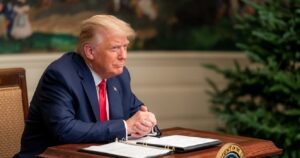Report Points to FBI Surveillance of Expected New Director
Tension is brewing at the Federal Bureau of Investigation as Kash Patel, President-elect Donald Trump’s appointee to lead the agency, prepares to take office next month amid revelations that the FBI previously surveilled Patel’s communications.
The report by a government watchdog highlights allegations of inappropriate surveillance tactics used by the FBI during Patel's role in the investigation of the agency's Russiagate operations, as covered by the New York Post.
In a controversial move, former acting FBI Director Andrew McCabe had overseen an investigation from late 2017, where Patel, a senior investigator with the House Intelligence Committee, was secretly monitored. The FBI obtained subpoenas to collect Patel's private phone and email records.
Patel's Role in the Investigation
In 2017, as Patel was leading an inquiry into the FBI's conduct during the infamous Trump-Russia collusion probe, the FBI launched its own investigation. The goal was to discover whether Patel and other congressional staffers leaked classified materials on alleged collusion to the media.
From September 2017 to March 2018, the FBI secretly gathered Patel's data from major tech firms such as Google and Apple. This was done without notifying Patel, an action later scrutinized by the Justice Department's Inspector General.
Emerging Details of Oversight Failings
These investigations aimed at Patel reportedly stemmed from concerns about multiple leaks regarding the Trump administration's alleged Russian ties. Patel, however, was kept in the dark until 2022, when Google disclosed the details of the subpoenas to him.
This development has raised questions about the FBI's respect for congressional oversight. The Inspector General's report cited concerns about the agency's infringement on Congress’s constitutional prerogatives.
Controversy surrounds the methods the FBI employed in its investigations, including crafting applications for subpoenas that did not inform judges they were targeting congressional attorneys. The Inspector General condemned this practice as misleading and flagrant overreach, with data stored from these investigations remaining in the FBI's possession.
Controversy Surrounding FBI's Methods
Patel, who is set to succeed Christopher Wray, has criticized these actions. He vowed to "clean house" and hold accountable those who he believes overstepped their authority during the Russiagate inquiry, referring to the investigation as a "witch hunt."
Jason Foster, a former Senate investigator, lambasted the leak investigation as unwarranted and largely a "fishing expedition." He accused McCabe of orchestrating these operations as a pretext to expose the actions of Patel and his colleagues. Foster pointed to past criticisms of McCabe, who had faced scrutiny for allegedly leaking details concerning a Hillary Clinton investigation.
A former ally of Patel also highlighted issues with the FBI's tactics, noting that important facts were allegedly omitted in court testimonies, such as the attorneys' congressional roles. It was claimed that investigators repeatedly and unfoundedly suggested Patel and others could destroy evidence or pose flight risks.
Broader Implications and Reaction
Andrew McCabe, now a CNN analyst, has voiced skepticism regarding Patel’s qualifications for the directorship. McCabe fears the FBI might regress to its earlier days under J. Edgar Hoover, becoming an extension of the administration’s political agenda.
Patel responded to criticisms of McCabe's past actions, referencing McCabe’s authorization of one of the disputed FISA warrants used in the surveillance of former Trump advisor Carter Page. As McCabe signed that warrant, Patel described his actions as "gangster."
These historically suppressed details are emerging at a crucial time when the transition of leadership at the FBI appears imminent. Christopher Wray is scheduled to depart as President Biden’s term concludes, making way for Patel's appointment.
Conclusion and Future Outlook
With the spotlight on the FBI's internal practices and oversight shortcomings, questions remain regarding potential impacts on the agency's integrity and public trust. Importantly, Kash Patel has articulated his intentions, which might see a significant shift in FBI operations and accountability protocols once he assumes leadership.
As the statute of limitations to pursue legal actions against former FBI officials involved in the investigations exhausts, the situation remains poignant for the incoming director. The developments underscore an evolving narrative, leaving many to anticipate how these revelations will influence the FBI’s trajectory in an increasingly polarized era.




